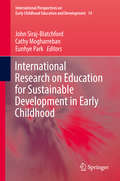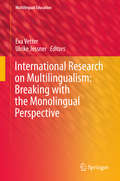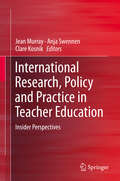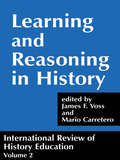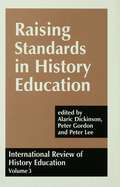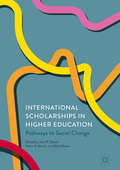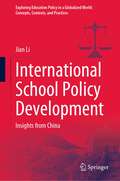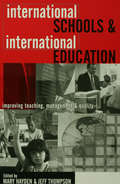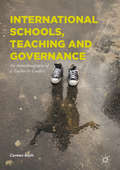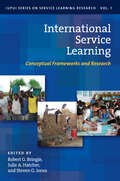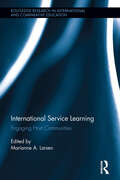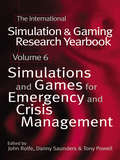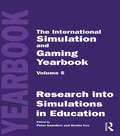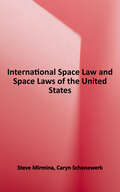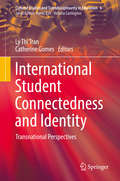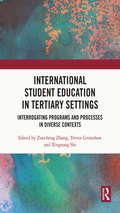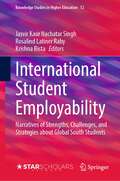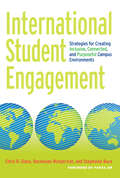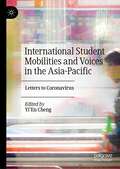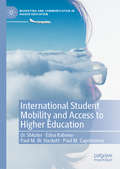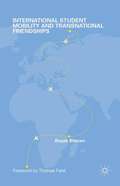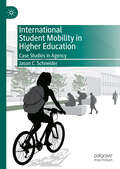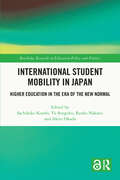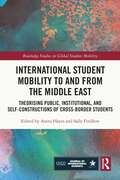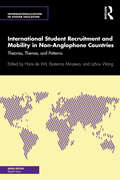- Table View
- List View
International Research on Education for Sustainable Development in Early Childhood
by John Siraj-Blatchford Cathy Mogharreban Eunhye ParkThis book offers a perspective on Education for Sustainable Development in Early Childhood (ESDEC) that is far removed from the 'business as usual' notion of an extended, predominantly environmental, educational curriculum for preschools. It presents a vision of sustainable development that has relevance to Early Childhood Care and Education (ECCE) from birth to school; it is relevant as much to homes, family support and health settings as it is to educational settings, and is as much concerned with health and wellbeing as with education. The book provides a perspective that is fundamentally embedded in notions of interdependency. It places an emphasis upon the importance of recognising the interdependency of peoples within and between nation states; the ecological interdependencies of the natural world; of humanity and nature; and most significantly the interdependency of adults and children. These emphases have their origins in the grassroots studies included in the ten chapters representing countries from around the world. The book reflects the idea that only global solutions and initiatives are capable of addressing the global challenges of climate change, environmental pollution, and global threats to ecological systems and biodiversity.
International Research on Multilingualism: Breaking with the Monolingual Perspective (Multilingual Education #35)
by Eva Vetter Ulrike JessnerThis volume contributes to a better understanding of both psycho- and sociolinguistic levels of multilingualism and their interplay in development and use. The chapters stem from an international group of specialists in multilingualism with chapters from Austria, Canada, Germany, Hungary, Israel, Italy, Slovakia, South Africa, Spain and the United States. The chapters provide an update on research on third language acquisition and multilingualism, and pay particular attention to new research concepts and the exploration of contact phenomena such as transfer and language learning strategies in diverse language contact scenarios. Concepts covered include dominant language constellations, mother tongue, germination factors and communicative competence in national contexts. Multilingual use as described and applied in the volume aims at demonstrating and identifying current and future challenges for research on third language acquisition and multilingualism. The third languages in focus include widely and less widely used official, minority and migrant languages in instructed and/or natural contexts, including Albanian, Arabic, Basque, English, French, German, Hungarian, Italian, Romanian, Spanish, Punjabi, Russian, Turkish, and Vietnamese, thereby mapping a high variety of language constellations.
International Research, Policy and Practice in Teacher Education: Insider Perspectives
by Jean Murray Clare Kosnik Anja SwennenThis unique book is an important source of information for all of those who educate future teachers and those who participate in teacher education as students, researchers, educators and policymakers. The volume also contributes to the international development of higher quality and research-led teacher education provision by providing clear evidence of policy impact. It draws on original research studies, conducted across eight countries in North America, Europe and Australia to analyse the impact of teacher education policy initiatives on ‘insiders’ in the fields, including education students, teacher educators and mentors in schools. In achieving this, the various chapters in the book analyse the commonalities and differentiations in the many policy reforms in teacher education currently being implemented by national governments. The book reveals some of the hidden consequences of these recent ‘reform’ efforts. It is also of use for leaders and policy makers in teacher education, providing them with insider perspectives from both theory and practice and making it possible for them to develop research-informed decisions that take into account the voices of insiders. Few texts have considered international policy trends alongside the impact they have had on significant stakeholder groups ‘inside’ teacher education. In redressing this omission, the book contributes to a better understanding of and improved practice of work in teacher education, both pre- and in-service.
International Review of History Education: International Review of History Education, Volume 2
by Mario Carretero James F. VossThis volume consists of the proceedings of an international conference on cognition and instruction in history. The papers cover several areas: historical narratives and history teaching; the use of texts, documents and images in learning history; and historical explanation and understanding.
International Review of History Education: International Review of History Education, Volume 3 (Woburn Education Series)
by Peter Lee Peter Gordon Alaric DickinsonThe third volume in this international review takes "raising standards" as its central theme. Raising standards is no simple matter, either conceptually or empirically, whatever politicians might think. If it is to happen, it must draw on research and practical experience from other countries.
International Scholarships in Higher Education
by Joan R. Dassin Robin R. Marsh Matt MawerThis book explores the multiple pathways from scholarships for international study to positive social change. Bringing together studies from academic researchers, evaluators and program designers and policymakers from Africa, Asia, Latin and North America, Europe, and Australia, the book compiles the latest research and analysis on the policy, practice, and outcomes of international scholarship programs. Contributions examine the broad trends in sponsored overseas study, program design considerations, the dynamics of the immediate post-scholarship period and the impact of scholarships on international education and development. Particular attention is focused on assessment and evaluation, the complexities of selecting awardees, the dynamics of returning home and concerns about brain drain and the state of knowledge and research on long-term outcomes of international scholarships with social change aims. nt>
International School Policy Development: Insights from China (Exploring Education Policy in a Globalized World: Concepts, Contexts, and Practices)
by Jian LiThis book investigates the international school policy reform in China from various perspectives. In recent years, international schools, international classes, international departments, and various international education projects have emerged in the field of education in China. This book explores and analyzes the idea of international schools, and discusses different aspects of the conceptual model of international education policy development in China, including international school policy, student cultivation, teacher cultivation, school management, curriculum, and quality assessment of international schools. In addition, this book offers a comprehensive, systematic, and practical perspective on shaping China’s international school policy development and management. This book serves as a guide for scholars and researchers who are interested, and work in, research on internationalization development in China, administrators, and stakeholders in China's education system, and graduate students who major or minor in the field of internationalization development in China.
International Schools and International Education: Improving Teaching, Management and Quality
by Mary Hayden Jeff ThompsonThis work tackles the issues that staff and management of international schools need to address in order to ensure that their teaching and organization is of a high standard and quality. It contains a wide range of contributions from international school experts around the world.
International Schools, Teaching and Governance
by Carmen BlythThis book examines how injustice based on social positioning is performed within the context of international schools. Drawing on the lived experiences of an international school teacher, it proposes and explores the notion that teachers, in being constituted and positioned as subordinate within the hierarchy that is the international school, leads to their being wronged on three counts: epistemically for being wrongfully mistrusted; ethically for being wrongfully excluded; and ontologically for being wrongfully positioned as a lesser human being. The book addresses the dearth of research currently available on conflict in international schools and how conflict between teachers and administrators is dealt with in and by such institutions. It will be valuable reading for students and teachers of education and sociology, and those interested in the workings of international schools.
International Service Learning: Conceptual Frameworks and Research
by Robert G. Bringle Julie A. Hatcher Steven G. JonesInternational Service Learning (ISL) borrows from the domains of service learning, study abroad, and international education to create a new pedagogy that adds new and unique value from this combination. It is a high-impact pedagogy with the potential to improve students’ academic attainment, contribute to their personal growth, and develop global civic outcomes. The international service experience provides opportunities for additional learning goals, activities, and relationships that are not available in a domestic service learning course or in a traditional study abroad course. The service experience develops reflection while shedding light on and providing an added dimension to the curricular component of the study abroad course. The international education component further broadens students’ perspectives by providing opportunities to compare and contrast North American and international perspectives on course content.This book focuses on conducting research on ISL, which includes developing and evaluating hypotheses about ISL outcomes and measuring its impact on students, faculty, and communities. The book argues that rigorous research is essential to improving the quality of ISL’s implementation and delivery, and providing the evidence that will lead to wider support and adoption by the academy, funders, and partners. It is intended for both practitioners and scholars, providing guidance and commentary on good practice. The volume provides a pioneering analysis of and understanding of why and under what conditions ISL is an effective pedagogy.Individual chapters discuss conceptual frameworks, research design issues, and measurement strategies related to student learning outcomes; the importance of ISL course and program design; the need for faculty development activities to familiarize faculty with the component pedagogical strategies; the need for resources and collaboration across campus units to develop institutional capacity for ISL; and the role that community constituencies should assume as co-creators of the curriculum, co-educators in the delivery of the curriculum, and co-investigators in the evaluation of and study of ISL. The contributors demonstrate sensitivity to ethical implications of ISL, to issues of power and privilege, to the integrity of partnerships, to reflection, reciprocity, and community benefits
International Service Learning: Engaging Host Communities (Routledge Research in International and Comparative Education)
by Marianne A. LarsenInternational service learning (ISL) programs are growing more popular with students looking to advance their skills and knowledge to become global citizens. While the benefits of these programs among students are well documented, little is known about the implications they have on host communities themselves. This volume explores the impact of ISL programs on members of host communities (e.g. host families and local partner NGOs) who are increasingly influenced by the presence of international students in their lives. Drawing upon post-colonial, feminist and other critical and decolonizing theories, it examines the complicated power relations between North American ISL students and host communities in East and West Africa, the Caribbean and Central America. It stresses the importance of developing trusting relations between ISL students, faculty and individuals in the host communities to create mutually engaging learning experiences.
International Simulation and Gaming Research Yearbook: Simulations and Games for Emergency and Crisis Management
by John Rolfe Danny Saunders Tony PowellThe theme of this volume is emergency and crisis management and how games and simulations are effective tools in dealing with these issues. The work brings together topical contributions from international figures in the field of games and simulations.
International Simulation and Gaming Yearbook
by Peter Saunders Benita CoxThis text brings together topical contributions from figures in the field of games and simulations, representing the current international thinking and best practice.
International Space Law and Space Laws of the United States
by Steve Mirmina Caryn SchenewerkThis book provides helpful practice tips for representing clients and doing business in today's commercial space industry, as well as important coverage of the essentials for students of Space Law. Each chapter explores a nuanced space law issue and concludes with review questions. Written by two Georgetown Space Law professors who are also Space Law practitioners with more than 50 years of combined expertise having worked as legal counsel for NASA, in the halls of Congress, and in the Executive Branch, this book explains complex regulations in approachable language and is thoroughly annotated. This work is valuable for students of Space Law as well as practitioners. It will serve as a handy desk reference for years to come.
International Student Connectedness and Identity
by Catherine Gomes Ly Thi TranThis book focuses on the interrelationship between international student connectedness and identity from transnational and transdisciplinary perspectives. It addresses the core issues surrounding international students' physical and virtual connectedness to people, places and communities as well as the conditions that shape their transnational connectedness and identity formation. Further, it analyses the nature, diversity and complexity of international student connectedness and identity development across different national, social and cultural boundaries.
International Student Education in Tertiary Settings: Interrogating Programs and Processes in Diverse Contexts
by Zuocheng Zhang Trevor Grimshaw Xingsong ShiInternational Student Education in Tertiary Settings addresses key issues in international student education programme design and implementation. It maps contemporary theories and practices in international students’ transcultural learning and engagement and showcases successful tertiary education programmes for international students in Australia, China, Japan, the USA and the UK. The book highlights the opportunities for engaging international students that are built into the various programmes, international students’ strategies for coping with various challenges of engagement with their educational programmes, and a range of factors that confound their engagement in academic and intercultural learning. The broad coverage of international education programmes in a variety of geographical, sociocultural and pedagogical settings enables the discussion about the complexity of contemporary international student education, shared challenges and productive ways of engaging international students in transcultural learning and the prospect of sustainable engagement. The principles and insights into programme design and implementation to engage international students will be useful for researchers and practitioners in international student education, academics tasked with teaching international students in their class, and administrators responsible for managing and providing services to international students.
International Student Employability: Narratives of Strengths, Challenges, and Strategies about Global South Students (Knowledge Studies in Higher Education #12)
by Rosalind Latiner Raby Krishna Bista Jasvir Kaur Nachatar SinghThis book explores how international undergraduate and graduate students navigate their higher educational institutional (HEI) experiences and employability prospects in both Global North and Global South universities. The chapter authors examine how students from the Global South use their agency to apply their HEI experiences to meet their needs, gain skills, and envision alternative pathways to adapt to economic, environmental, and political changes.Through diverse student voices, the book sheds light on the challenges faced by these international students in the job market. It highlights the importance of promoting diversity and equity in higher education. The book emphasizes the need to consider the cultural circumstances of global south students to enhance their employability. The book contributes to a deeper understanding of the challenges and opportunities faced by Global South international students in the job market. It offers effective strategies for educators, policymakers, and employers to support these students.
International Student Engagement: Strategies for Creating Inclusive, Connected, and Purposeful Campus Environments
by Chris R. Glass Rachawan Wongtrirat Stephanie BuusThis book responds to the growing calls among international educators, activists, and students themselves to pay closer attention to the qualitative dimensions of international students’ experiences at U.S. colleges and universities. This book outlines deep approaches to the academic and social integration of international students at U.S. colleges and universities. It describes concrete examples of strategies to enhance the international student experience across a wide range of institutional types, and explores actions that have enabled colleges and universities to create more inclusive, connected, and purposeful campus environments for international students. It fleshes out the effects of these actions through the first person narratives of international students themselves. It focuses on reinforcing an institution’s existing strengths and capacities to help academic leaders at these institutions to develop comprehensive strategies that will enable the creation of inclusive campus climates for international students.The book combines evidence derived from the national Global Perspective Inventory dataset, the experiences of institutions at the forefront in developing effective strategies, as well as first-person narrative experiences of international students to illustrate the real-life consequences of institutional policies, practice, and programs.One of the aims of this book is to take readers on a journey, from community colleges to liberal arts institutions to large public flagship research universities, from rural parts of the U.S.to highly-populated urban areas in order to raise questions about the impact of the surge of international students in these environments and about the corresponding challenges that confront senior administrators seeking to strengthen and deepen connections for the students. The book explores some of the actions that universities and colleges across the U.S. have taken to create more inclusive, connected, and purposeful campus environments for their international students, placing particular emphasis on the importance of tapping and reinforcing each institution’s existing strengths and capacities in the development of strategies that will enable it to create more inclusive campus climates for current and incoming international students, and engaging in active collaboration with all departments and offices across the campus, with the larger community, and most important, with the international student community itself.
International Student Mobilities and Voices in the Asia-Pacific: Letters to Coronavirus
by Yi’En ChengThis edited volume explores core questions on education and transnational mobility in a time characterized by a global pandemic, recasting them through the lenses of regimes, experiences, and aspirations. The volume brings together 19 short essays in the form of letters addressed to the coronavirus and written by international students , together with nine striking illustrations that depict emotive scenes from the essays, and nine academic commentaries that analytically link these personal narratives to broader societal structures. This book represents a timely intervention, providing an intimate glimpse into young people’s hopes and the challenges they face concerning their education and mobility.
International Student Mobility and Access to Higher Education (Marketing and Communication in Higher Education)
by Paul M.W. Hackett Or Shkoler Edna Rabenu Paul M. CapobiancoThis book offers a comprehensive look into issues and trends driving international student mobility as the phenomenon becomes increasingly prevalent worldwide. Chapters first present an expanded definition of student mobility in the context of internationalization and go on to discuss the underlying motivations, issues, and challenges students face in attaining successful outcomes. The authors employ marketing concepts to illustrate ideas and recommendations for better attracting and integrating international students into academic institutions abroad with the goal of greater satisfaction for students and improved profitability for the universities they attend.
International Student Mobility and Transnational Friendships
by Basak BilecenFriends play a crucial role in international students' lives. This book explores the characteristics of the friendship networks of international doctoral students by analysing the relationships between these students and their friends, both in the country of education and across several national borders.
International Student Mobility in Higher Education: Case Studies in Agency
by Jason C. SchneiderThis book offers an in-depth look at the experiences of international students as they pursued undergraduate degrees in the US. Drawing on recurring interviews with the students and other qualitative data collected over four years, the book investigates how the students’ academic development intersected with other life factors, including their status as international students, their linguistic backgrounds, the challenges of functioning in a new sociocultural environment, and the circumstances of living in the US on a student visa. In sum, the book presents an understanding of the students as agentive young adults who exerted great effort to make US higher education align with their own desires for spatial, ideological, and socioeconomic mobility.
International Student Mobility in Japan: Higher Education in the Era of the New Normal (Routledge Research in Education Policy and Politics)
by Ryoko Nakano Akito Okada Yu SengokuIn light of the COVID-19 crisis, this edited volume explores the changing landscape of International Student Education in Japanese universities and the impact on global student mobility.Through analysing a wide range of data, the book engages historical, cultural, linguistic and pedagogical contexts relating to higher education in Japan. With a particular focus on Japanese tertiary education, the chapters provide comprehensive analysis from surveys and interviews conducted since 2020 amongst Japanese and non-Japanese Higher Education institutions (HEIs) on leadership styles, decision-making behaviours and perspectives on higher education practices in Japan. The authors also examine the challenges and impact on student mobility and international student education, and present future directions for the internationalisation of higher education in post-pandemic Japan.This book will appeal to researchers, educators and anyone with an interest in higher education development, international student mobility and language learning.Chapters 5 and 9 of this book are freely available as a downloadable Open Access PDF at http://www.taylorfrancis.com under a Creative Commons [Attribution-Non Commercial-No Derivatives (CC BY-NC-ND)] 4.0 license. The publication of these chapters as an open-access work was generously supported by the Japan Society for the Promotion of Science (JSPS) through the Grants-in-Aid for Scientific Research (KAKENHI) [Grant Number JP20KK0052].
International Student Mobility to and from the Middle East: Theorising Public, Institutional, and Self-Constructions of Cross-Border Students (Routledge Studies in Global Student Mobility)
by Aneta HayesThis volume investigates how international students in and from the Middle East are constructed by nations, institutions, other students, and themselves. Making a valuable contribution to understanding the nuances and complexities of educational politics and priorities affecting these constructions, the text considers the broader impacts of discourse on internationalisation. Offering a unique combination of critical analysis of educational policies combined with empirical contributions through authors’ own research, chapters highlight intersections between politics, the internationalization of higher education, and the construction of mobile learners. Emphasizing variation and nuance in the internationalization of policies in the Gulf Cooperation Countries, Syria, Israel, and Turkey, the volume offers a theoretical framework to help understand the political, educational, and ethical implications of emerging constructions of international students and their comparison across the Middle East. This timely volume will benefit researchers, academics, and educators with an interest in higher education, international and comparative education, as well as the Middle East more specifically. Those involved with educational education policy and politics, specifically related to the Middle East, will also benefit from this volume.
International Student Recruitment and Mobility in Non-Anglophone Countries: Theories, Themes, and Patterns (Internationalization in Higher Education Series)
by Hans De Wit Ekaterina Minaeva Lizhou WangInternational Student Recruitment and Mobility in Non-Anglophone Countries offers a detailed analysis of global dimensions and trends in international student mobility and recruitment. It examines current data on student flows, policies and instruments, obstacles and opportunities for recruitment, and the roles of multiple stakeholders from different parts of the world. Considering the current geopolitical developments and tensions, increased competition for global talent, health and sustainability concerns, growing nationalism, and other factors, non-Anglophone countries are likely to increase their recruitment efforts moving forward. This book highlights the initiatives and instruments of these countries to attract international students and build long-term internationalization strategies. With case studies from Africa, Asia, Europe, the Middle East, and Latin America, International Student Recruitment and Mobility in Non-Anglophone Countries is a must-read text for international education policy advisors at the national and institutional levels and in the international higher education industry around the globe.
